12 Best Tools to Track Environmental Impact for 2025
Karel Maly
July 6, 2025
Achieving ambitious sustainability goals, from regulatory compliance to genuine net-zero commitments, is no longer a matter of intention but of precise execution. For organisations with complex, multi-tiered supply chains, this execution hinges on one critical capability: accurate, real-time environmental impact measurement. Without the right data infrastructure, sustainability strategies remain abstract, and progress is impossible to verify. This is where specialised software becomes indispensable, transforming opaque supply chain activities into a clear, actionable dataset. The challenge, however, is navigating a crowded market of platforms, each with distinct methodologies, feature sets, and ideal use cases.
This comprehensive resource is designed to cut through that complexity. We provide an in-depth analysis of the leading tools to track environmental impact, moving beyond marketing claims to offer a practical guide for logistics managers, Chief Sustainability Officers, and compliance professionals. For each platform-including industry mainstays like SimaPro and innovative solutions like Carbonpunk-we break down core functionalities, integration capabilities, pricing structures, and specific limitations.
You will find a detailed look at how each tool handles different scopes of emissions, its approach to Life Cycle Assessment (LCA), and its suitability for various operational scales. We explore which platforms excel at raw material traceability versus those better suited for enterprise-wide carbon accounting. Each entry includes screenshots and direct links, enabling you to compare options efficiently and identify the single best platform to support your organisation's unique environmental, social, and governance (ESG) objectives. Our goal is to equip you with the insights needed to make a confident, informed decision.
1. Carbonpunk
Carbonpunk establishes itself as a premier, enterprise-grade solution among tools to track environmental impact, specifically engineered for organisations navigating the complexities of modern supply chains. It moves beyond simple carbon calculators by offering an AI-driven platform that integrates directly with logistics providers or ingests data via CSV. This seamless data pipeline is the foundation for its core strength: achieving over 95% data accuracy in real-time CO₂ emissions monitoring, a figure substantiated by advanced validation techniques.
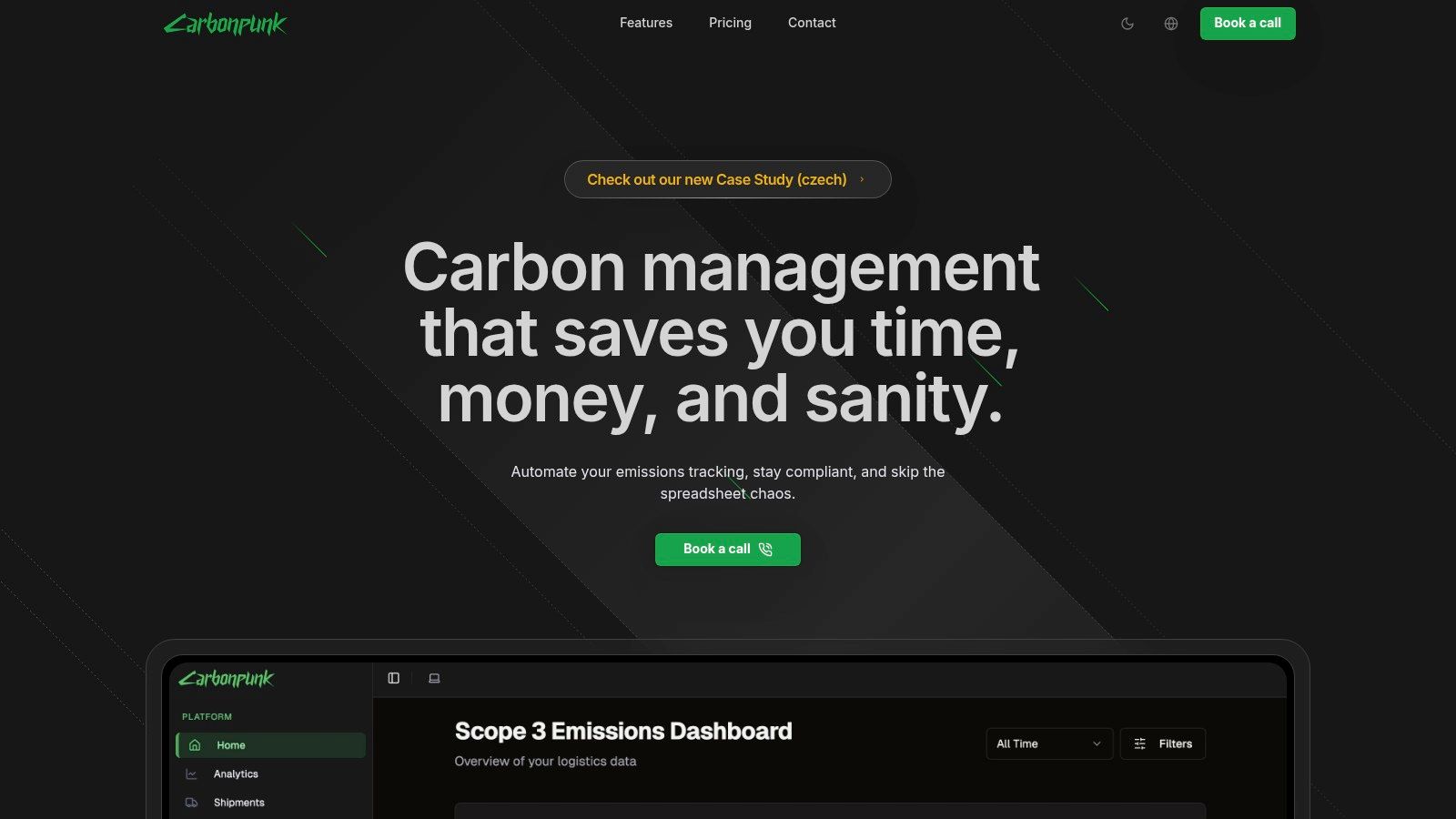
This high-fidelity data empowers the platform’s intelligent analytics engine to deliver concrete, actionable recommendations. For logistics and sustainability managers, this translates into tangible strategies like optimising delivery routes or shifting to lower-emission transport modes, with documented potential for reducing transport-related emissions by 20–30%. It effectively transforms sustainability from a cost centre into a driver of operational efficiency and competitive advantage.
Key Strengths and Use Cases
Carbonpunk excels in turning complex regulatory requirements into a streamlined, automated process. The platform is purpose-built for robust ESG reporting, a critical function for any large enterprise.
- For Compliance Officers: The platform automates the generation of audit-ready reports that are fully compliant with major international frameworks, including the GHG Protocol, TCFD, and CDP. This eliminates manual data consolidation and reduces the risk of non-compliance penalties.
- For Logistics Managers: The real-time, customisable dashboards provide continuous visibility into the supply chain's carbon footprint. This allows for immediate performance benchmarking and the identification of emission hotspots, enabling data-driven decisions that also reduce fuel costs.
- For Chief Sustainability Officers (CSOs): Predictive forecasting and scenario modelling tools empower CSOs to set and track progress towards ambitious net-zero targets. The platform provides the verifiable data needed to build stakeholder trust and communicate sustainability achievements effectively.
Key Benefit: Carbonpunk’s greatest advantage is its ability to convert granular, real-time emissions data into strategic business intelligence, directly linking sustainability efforts to operational cost savings and regulatory preparedness.
Practical Considerations
While its capabilities are extensive, prospective users should note that Carbonpunk is an enterprise-level platform. Pricing is not publicly listed and requires direct consultation for a custom quote tailored to your organisation’s scale and integration needs. The initial setup may also require a coordinated effort between your internal teams and multiple logistics partners to establish the necessary data feeds, a common requirement for systems offering this level of accuracy.
For those evaluating top-tier solutions, Carbonpunk provides additional insights on their blog. You can explore a detailed comparison in their guide to the top carbon footprint tracking software for 2025.
- Platform Access: https://www.carbonpunk.ai/en
2. Greenly
Greenly is a prominent technology platform designed to streamline carbon accounting for businesses. It distinguishes itself with an accessible, user-friendly interface that simplifies the often complex process of measuring, managing, and ultimately reducing carbon emissions. This makes it one of the most approachable yet powerful tools to track environmental impact, particularly for small to medium-sized enterprises (SMEs) that may lack dedicated ESG teams.
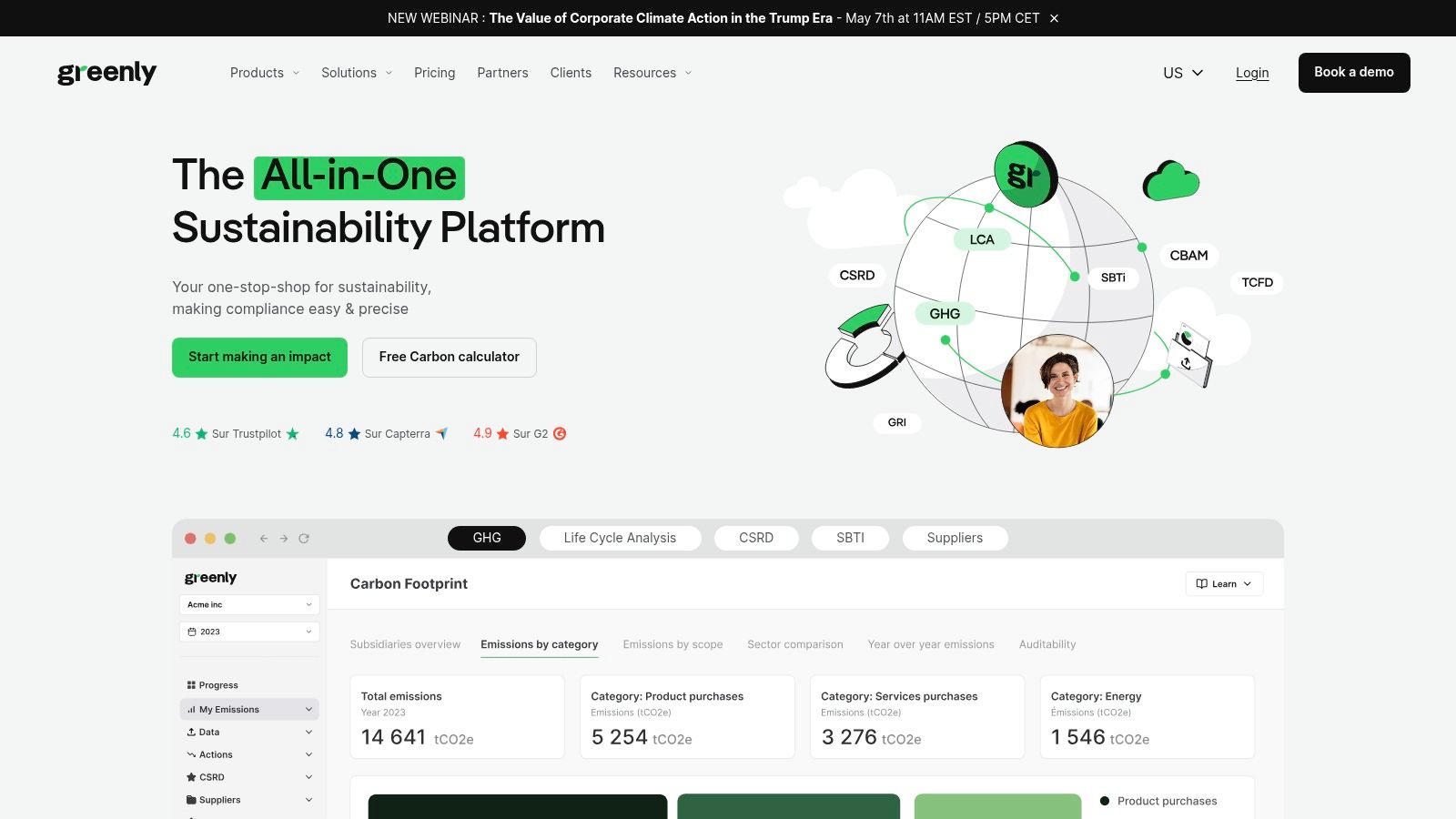
The platform automates much of the data collection process by integrating directly with over 100 enterprise software systems, including accounting software, travel management tools, and cloud providers. This automation is a key differentiator, significantly reducing the manual effort required for a comprehensive carbon footprint analysis.
Ideal Use Case and Key Features
Greenly is particularly effective for organisations embarking on their sustainability journey or those needing a certified, audit-ready carbon assessment without a steep learning curve. Its methodology is aligned with international standards like the GHG Protocol, ensuring the credibility of its reports.
- Feature Focus: Automated data integration, life cycle assessments (LCA), and supplier engagement modules.
- Data Security: The platform is ISO 27001 compliant, a critical factor for enterprises handling sensitive financial and operational data.
- Implementation: The initial setup involves connecting company accounts (e.g., Xero, QuickBooks, SAP) to the Greenly platform. While this integration is a strength, new users should budget time for the initial configuration and data synchronisation to ensure accuracy.
Practical Assessment
While praised for its comprehensive services and usability, the platform's power lies in its integrations. Companies with highly customised or legacy IT systems might find the initial setup more involved. Pricing is tailored to company size and complexity, requiring a direct quote.
Key Benefit: Greenly excels at making robust carbon accounting accessible, providing a clear pathway from measurement to actionable reduction strategies and certified reporting.
Website: https://www.greenly.earth/
3. SimaPro
SimaPro is a world-leading professional life cycle assessment (LCA) software, setting the standard for detailed environmental footprint analysis of products and services. It is designed for LCA experts, sustainability professionals, and researchers who require granular, science-based insights to support strategic decision-making and product design. Unlike more automated platforms, SimaPro offers unparalleled depth, making it one of the most powerful tools to track environmental impact at a product or process level.
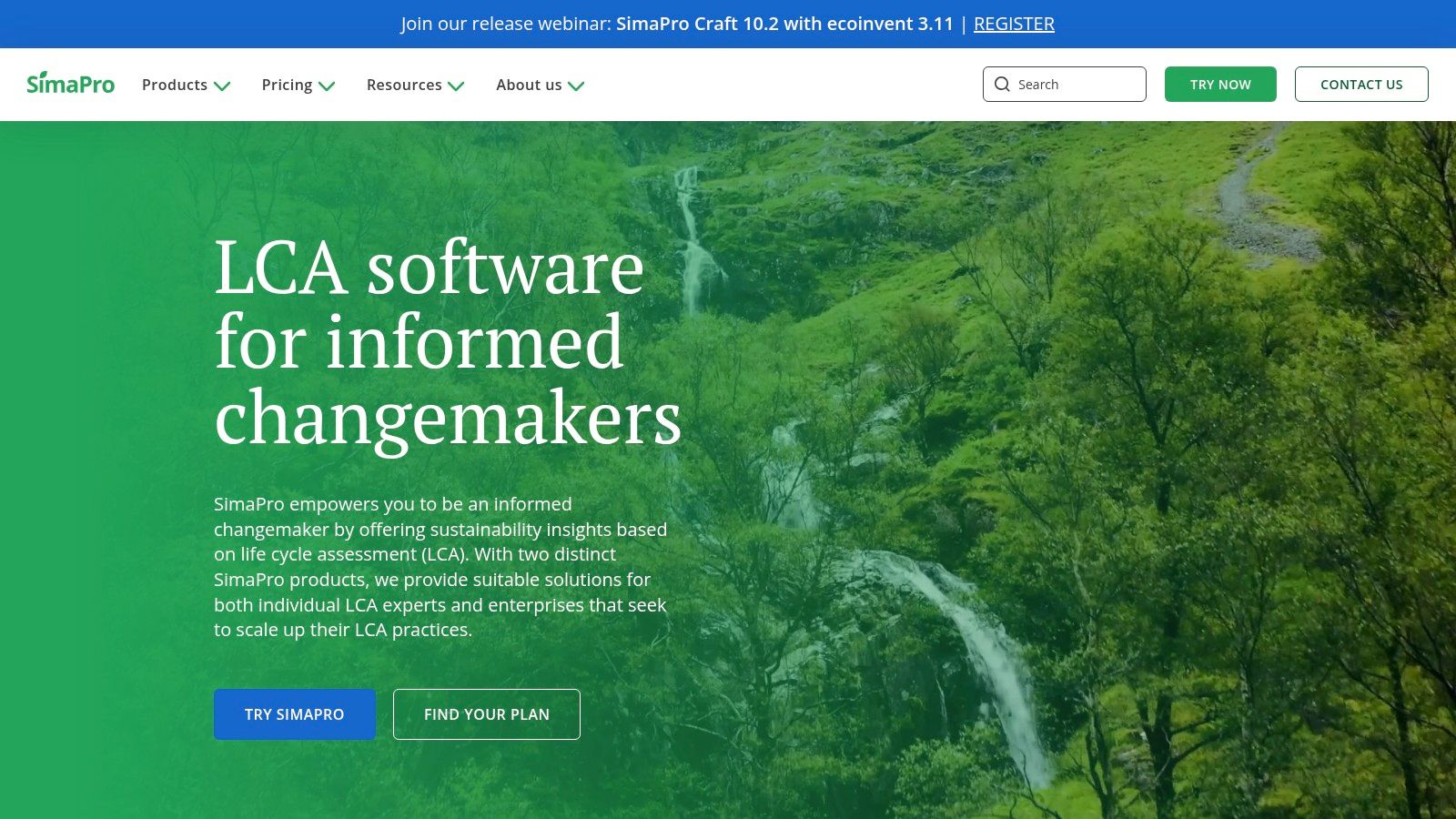
The software provides access to the industry-standard ecoinvent database, along with numerous other libraries, enabling comprehensive impact assessments across various categories like carbon footprint, water use, and ecotoxicity. Its strength lies in its transparency and methodological rigour, allowing users to model complex life cycles from raw material extraction to end-of-life.
Ideal Use Case and Key Features
SimaPro is the go-to solution for organisations needing to conduct in-depth, ISO-compliant LCA studies for product development, Environmental Product Declarations (EPDs), or detailed supply chain hotspot analysis. It is less of a corporate carbon accounting tool and more of a specialised scientific instrument for product-level investigation.
- Feature Focus: Comprehensive LCA and Life Cycle Costing (LCC) modelling, extensive impact assessment methods (e.g., ReCiPe, TRACI), and robust sensitivity and uncertainty analysis.
- Data Security: As a desktop-based application with multi-user server options, data management is controlled within the user's own IT environment, offering a high degree of security.
- Implementation: SimaPro is a professional tool with a significant learning curve. New users should expect to invest in formal training to utilise the software effectively. Its complexity is a direct result of its powerful capabilities.
Practical Assessment
While SimaPro is celebrated for its comprehensive LCA power and reliable data, it is not intended for beginners or for high-level corporate emissions reporting. Its user interface is functional but complex, prioritising analytical depth over simplified user experience. Pricing is based on licence type (e.g., professional, educational, multi-user) and requires a direct quote.
Key Benefit: SimaPro delivers unmatched depth and credibility for product life cycle assessments, empowering experts to make evidence-based decisions that genuinely reduce environmental impacts.
Website: https://simapro.com/
4. Enablon Environmental Analysis Software
Enablon, a Wolters Kluwer business, provides a robust enterprise-grade platform focused heavily on Environmental, Health, and Safety (EHS) and compliance management. It distinguishes itself with an emphasis on regulatory adherence, making it one of the most powerful tools to track environmental impact for large organisations operating in highly regulated industries. The software is engineered to manage vast amounts of data across global operations, ensuring that companies meet complex legal requirements while monitoring their environmental performance.
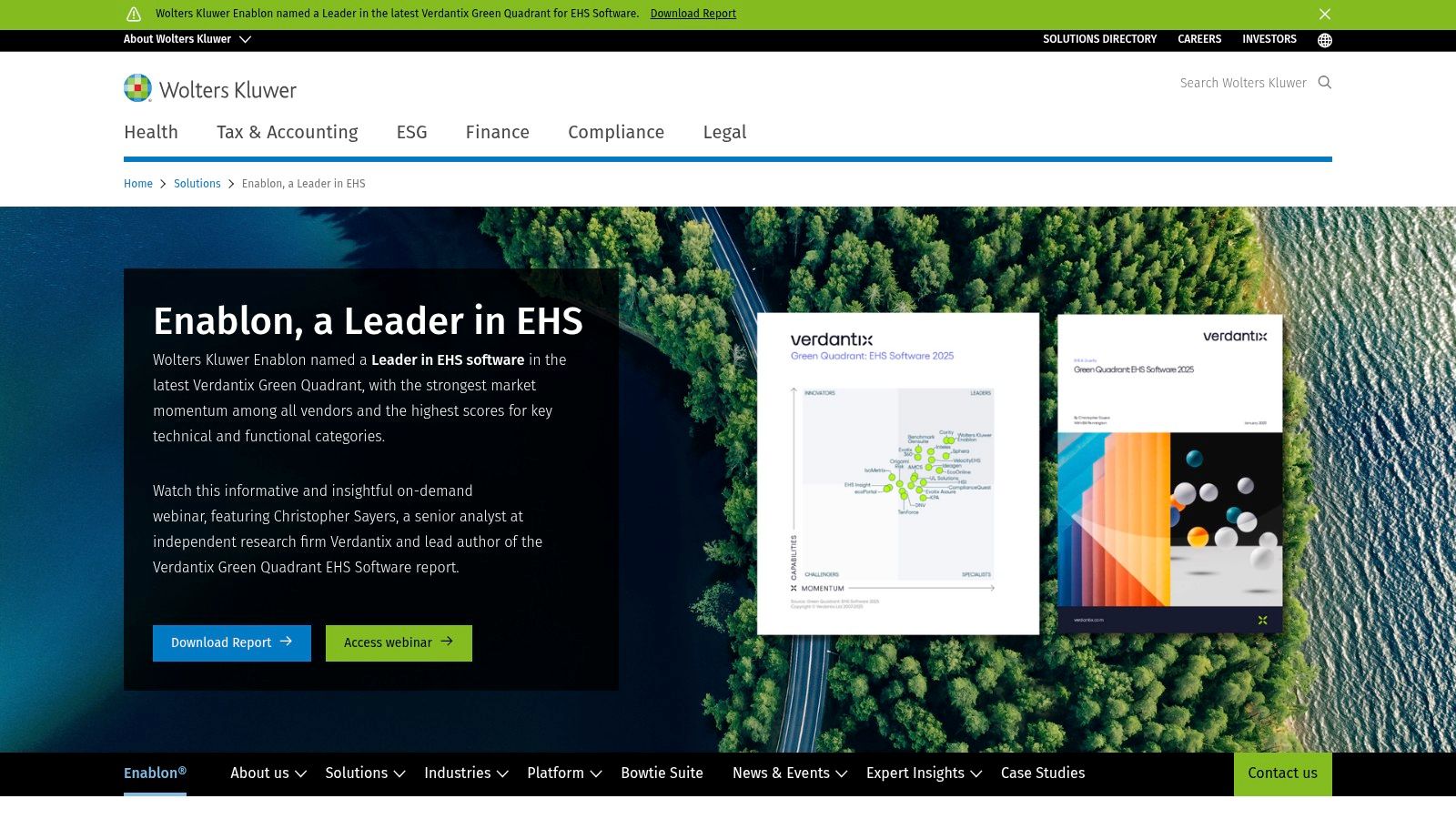
The platform’s strength lies in its modularity, allowing businesses to select and integrate the specific tools they need, from air and water quality management to waste and regulatory reporting. This customisable approach ensures a tailored fit for complex industrial and supply chain ecosystems.
Ideal Use Case and Key Features
Enablon is ideally suited for large, multinational corporations in sectors like manufacturing, energy, and chemicals that require meticulous compliance tracking and risk management. Its framework is designed to support standards such as ISO 14001, making it a critical asset for maintaining certifications. For a deeper analysis, you can learn more about how it fits into the broader landscape of ESG reporting tools.
- Feature Focus: Comprehensive compliance management tools, performance metrics tracking, and air compliance management.
- Data Security: As an enterprise solution, Enablon offers robust security protocols designed for sensitive corporate and operational data.
- Implementation: The implementation process is typically comprehensive and resource-intensive, often requiring dedicated project teams and collaboration with Enablon's professional services. This complexity reflects the platform’s depth and customisation capabilities.
Practical Assessment
While Enablon is a market leader for compliance-driven environmental management, its extensive nature means implementation can be complex and lengthy. It is not designed as a simple, plug-and-play solution for smaller businesses. Pricing is customised and available upon request, reflecting the enterprise scale of its offerings.
Key Benefit: Enablon provides an unparalleled, audit-ready framework for managing environmental compliance and risk at an enterprise scale, ensuring adherence to stringent international standards.
Website: https://www.wolterskluwer.com/en/solutions/enablon
5. GaBi LCA Software
GaBi by Sphera is a professional-grade Life Cycle Assessment (LCA) software suite, recognised as one of the most powerful and data-rich tools to track environmental impact at the product and process level. It is designed for deep, scientific analysis rather than high-level corporate carbon accounting, enabling users to model complex value chains and evaluate environmental performance from raw material extraction to end-of-life. This makes it a go-to solution for product designers, engineers, and sustainability experts focused on detailed eco-design and comprehensive reporting.
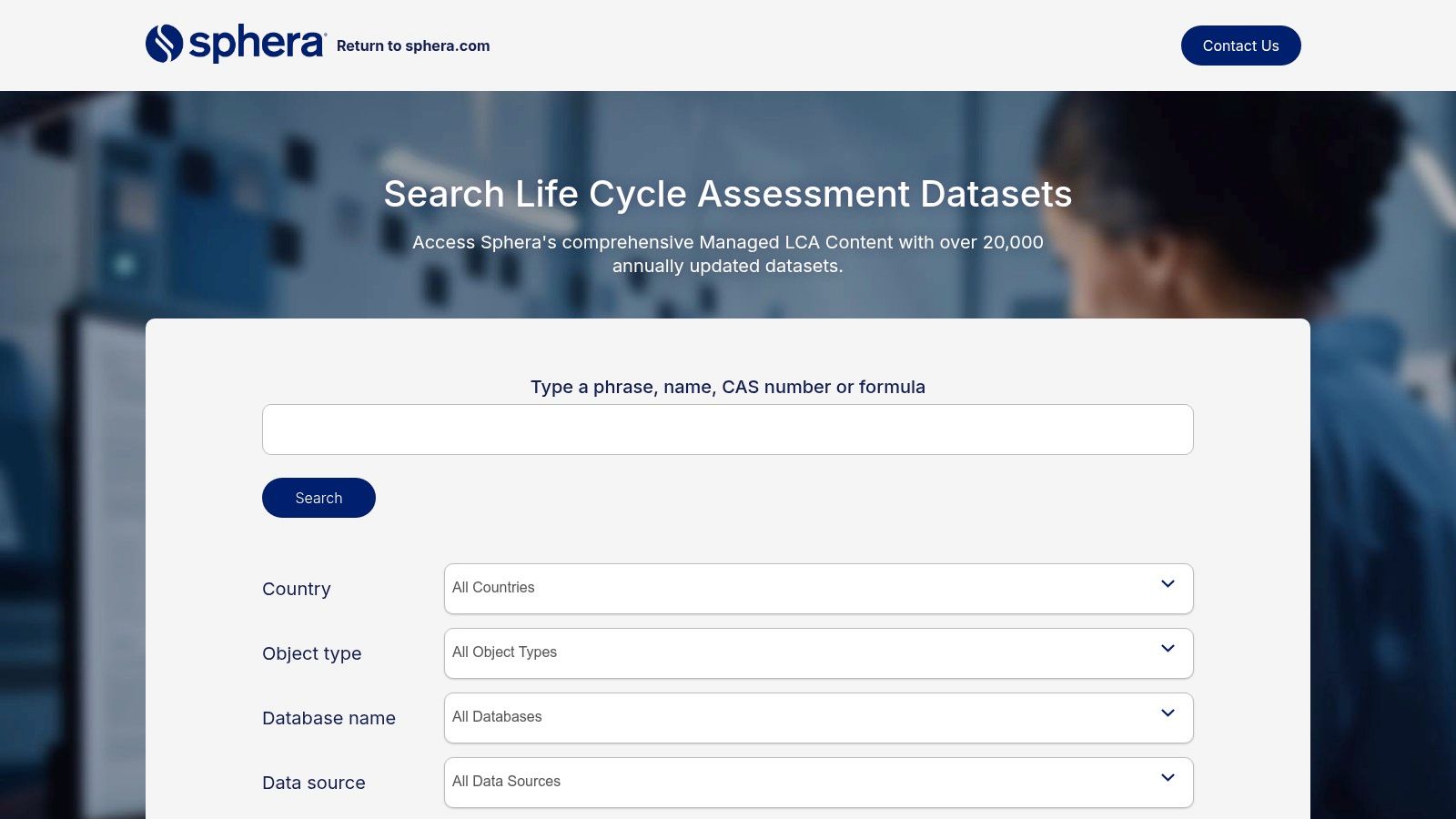
The platform's core strength is its extensive, high-quality, and regularly updated LCI (Life Cycle Inventory) database. This allows for incredibly granular and accurate assessments that can stand up to rigorous third-party scrutiny. GaBi empowers organisations to move beyond simple footprinting and conduct sophisticated scenario analyses to identify environmental hotspots and optimise product lifecycles.
Ideal Use Case and Key Features
GaBi is best suited for large enterprises and environmental consultants who require precise, data-driven insights for product development, regulatory compliance, and Environmental Product Declarations (EPDs). Its detailed modelling capabilities are ideal for organisations with complex manufacturing processes and supply chains.
- Feature Focus: Extensive integrated database, detailed scenario analysis, and robust data quality management.
- Data Security: As part of the Sphera suite, GaBi adheres to enterprise-level security protocols, ensuring the protection of sensitive product and process data.
- Implementation: GaBi is a sophisticated software requiring specialist knowledge. Implementation often involves dedicated training and is best handled by users with a background in LCA methodology to leverage its full potential.
Practical Assessment
The software is praised for its accuracy and comprehensive database, which is a significant advantage for detailed assessments. However, its power comes with a steep learning curve and a higher cost compared to simpler carbon calculators. Pricing is based on a licensing model and requires a direct quote from Sphera.
Key Benefit: GaBi excels at providing unparalleled depth and accuracy for product-level Life Cycle Assessments, enabling scientifically robust environmental optimisation and reporting.
Website: https://gabi.sphera.com/
6. OpenLCA
OpenLCA is a powerful, open-source and free life cycle assessment (LCA) software. It has carved out a unique space in the market by offering professional-grade sustainability and environmental assessment capabilities without the high licensing fees of commercial alternatives. This makes it an invaluable resource for academia, research institutions, and consultants, but also for companies seeking robust tools to track environmental impact on a limited budget.
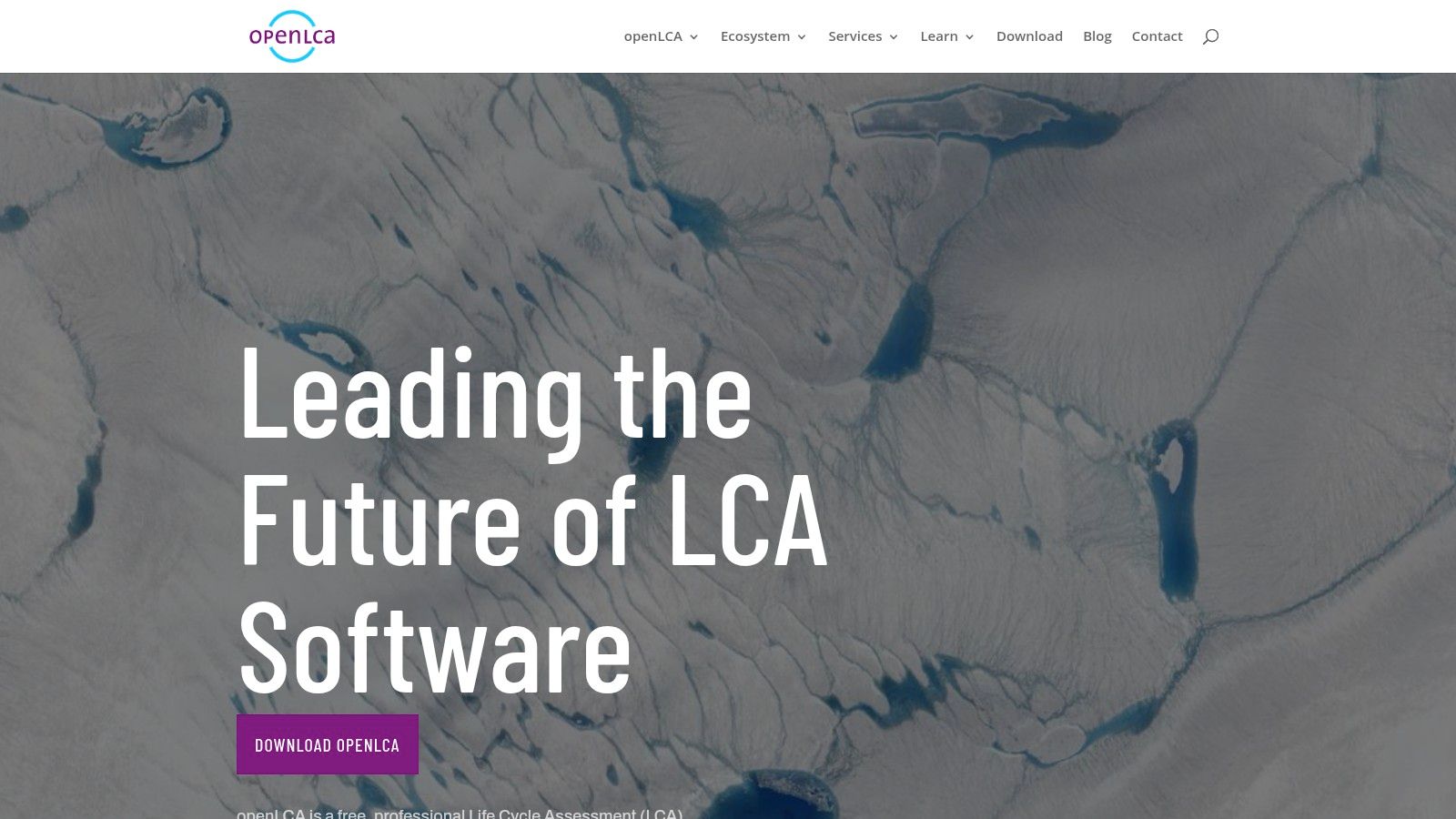
The platform’s core strength is its flexibility and scientific rigour. It allows users to model complex product life cycles and supply chains, from raw material extraction to end-of-life. It supports a wide range of impact assessment methods and can integrate with numerous life cycle inventory (LCI) databases, both free and commercial, giving users extensive control over their analysis.
Ideal Use Case and Key Features
OpenLCA is best suited for users with a strong background in life cycle assessment or environmental science who require a high degree of customisation. It is the go-to tool for detailed product carbon footprints (PCFs), environmental product declarations (EPDs), and in-depth academic research where transparency of methodology is paramount.
- Feature Focus: Open-source framework, compatibility with extensive LCI databases (like ecoinvent), and advanced calculation and analysis features.
- Data Security: As a desktop application, data is stored locally, giving the user complete control over security and confidentiality.
- Implementation: Users download the software directly. The primary challenge is not technical setup but the steep learning curve associated with LCA methodologies and sourcing appropriate data. Effective use requires significant domain expertise.
Practical Assessment
While its cost-free access is a major advantage, OpenLCA is not a plug-and-play solution. Its user interface is functional but less intuitive than many commercial SaaS platforms, and it demands a solid understanding of LCA principles for meaningful results. The cost is shifted from licensing fees to the user's time and expertise.
Key Benefit: OpenLCA democratises access to high-quality life cycle assessment, providing a transparent, flexible, and scientifically robust platform for expert users without financial barriers.
Website: https://www.openlca.org/
7. OneClickLCA
OneClickLCA is a highly specialised software platform dedicated to automating Life Cycle Assessments (LCAs), particularly for the construction, manufacturing, and infrastructure sectors. It has carved out a niche by focusing on streamlining compliance and environmental product declarations (EPDs), making it one of the go-to tools to track environmental impact for built environment projects. The platform integrates with design software like Revit and BIM, allowing for early-stage impact analysis directly within project workflows.
Its key differentiator is the world's largest construction-specific environmental database, which supports over 100 certification schemes and standards, including BREEAM, LEED, and DGNB. This vast repository allows users to quickly compare materials and design choices based on their environmental footprint, ensuring both compliance and optimisation.
Ideal Use Case and Key Features
OneClickLCA is best suited for architects, engineers, construction companies, and manufacturers who require certified, standards-compliant LCAs and EPDs. Its focus is less on broad corporate carbon accounting and more on the granular, product-level and project-level impact assessments critical to the building industry. As highlighted in guides to sustainability data management, specialised tools are often necessary for such specific industrial needs. Learn more about specialised sustainability data management software.
- Feature Focus: Automated LCA calculations, EPD generation, and integration with Building Information Modeling (BIM) software.
- Data Security: The platform operates on secure cloud infrastructure, with robust data protection protocols in place to handle sensitive project and product data.
- Implementation: Implementation involves integrating the tool into existing design and project management processes. For BIM users, this is relatively seamless, but teams should allocate time for training to maximise the platform's material comparison and optimisation features.
Practical Assessment
While powerful for its intended purpose, OneClickLCA’s specialisation means it is not an all-in-one corporate GHG management solution. Its strength is its depth in construction materials and building compliance, not broad Scope 1, 2, and 3 enterprise emissions. Pricing is based on subscription tiers and project needs, typically requiring a direct quote.
Key Benefit: OneClickLCA excels at providing fast, credible, and verifiable Life Cycle Assessments for the built environment, embedding sustainability analysis directly into the design and construction process.
Website: https://www.oneclicklca.com/
8. Ecologi
Ecologi offers a unique and highly accessible platform focused on collective climate action, making it one of the most engaging tools to track environmental impact for both individuals and businesses. It simplifies climate contributions by connecting a user's carbon footprint directly to tangible, high-impact climate projects, primarily reforestation and certified carbon avoidance initiatives. This model empowers users to take immediate, visible action against their emissions.
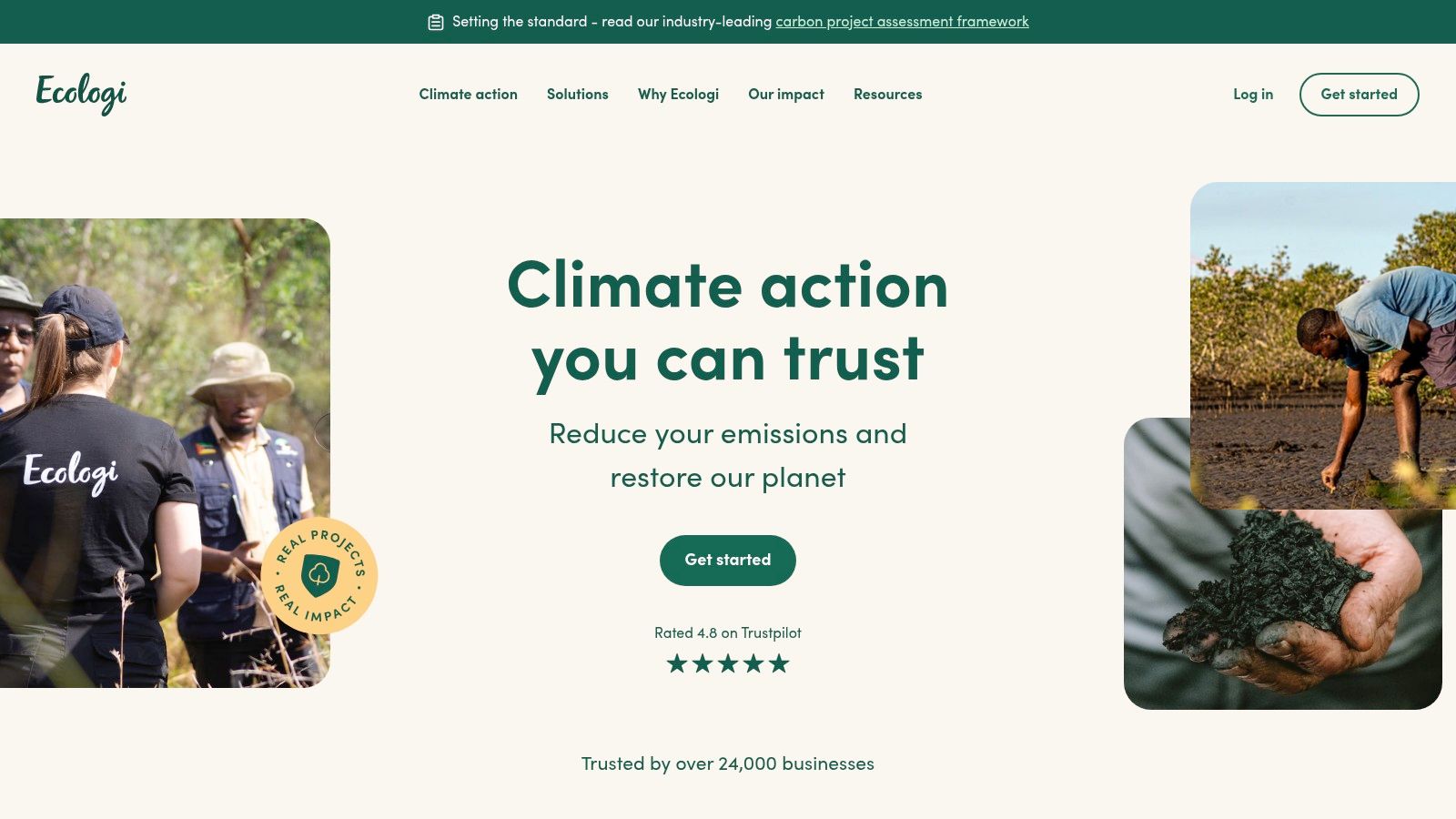
The platform operates on a subscription-based model, where monthly contributions fund the planting of trees and support a portfolio of carbon reduction projects. A key differentiator is its radical transparency; Ecologi provides public ledgers of its funding, project receipts, and tree-planting evidence, fostering a high level of trust and accountability.
Ideal Use Case and Key Features
Ecologi is ideal for businesses and individuals seeking a straightforward, transparent, and impactful way to offset their carbon footprint and contribute to global climate solutions. It is particularly popular with SMEs and consumer-facing brands that want to build a public-facing climate-positive identity and engage their customers in their sustainability journey.
- Feature Focus: Carbon footprint calculator, climate project funding subscriptions, and a public impact profile.
- Data Security: While not focused on deep operational data, Ecologi uses secure payment processing and standard data protection protocols for user accounts.
- Implementation: Getting started is simple. Users calculate their footprint with Ecologi's online tool and choose a subscription plan. Businesses can integrate Ecologi's API to link transactions or employee milestones to tree planting, automating their positive impact.
Practical Assessment
While Ecologi excels at making climate action visible and simple, its primary focus is on offsetting emissions rather than providing in-depth tools for direct operational reduction. For organisations needing granular Scope 1, 2, and 3 emissions analysis and reduction planning, Ecologi serves best as a complementary offsetting partner rather than a primary carbon accounting tool. Pricing is transparent and based on the number of employees for businesses or personal goals for individuals.
Key Benefit: Ecologi demystifies climate action by providing a transparent, tangible, and collective way to fund high-impact environmental projects, making it exceptionally effective for user and stakeholder engagement.
Website: https://ecologi.com/
9. Yayzy
Yayzy brings environmental impact tracking to the individual and enterprise level through financial data, positioning itself as a unique fintech-driven solution. It operates primarily as an API that integrates with banking apps and other financial platforms, automatically calculating the carbon footprint of every transaction a user makes. This makes it one of the most seamless tools to track environmental impact on a personal or employee level, connecting daily spending directly to its environmental cost.
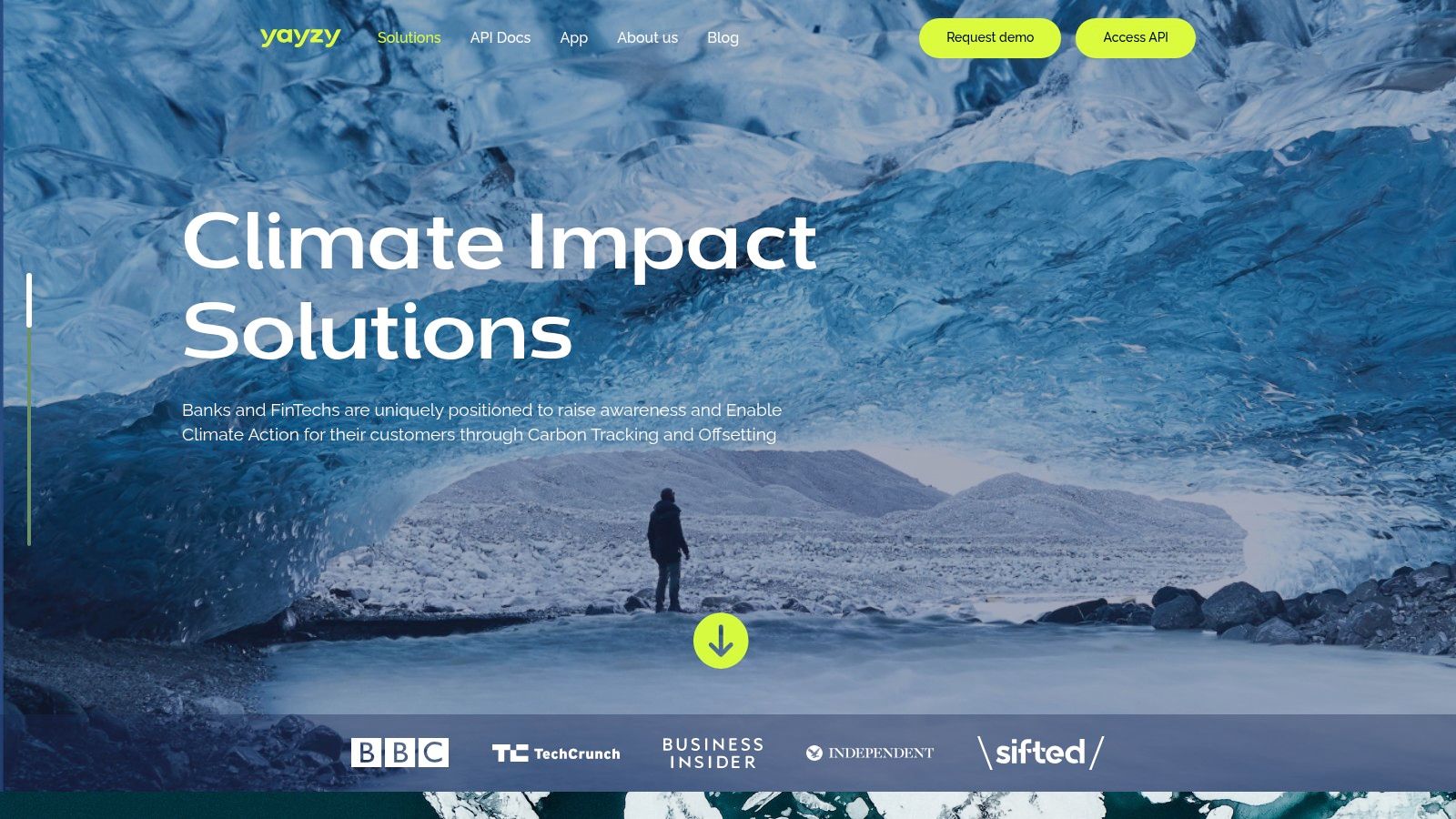
The platform distinguishes itself by leveraging machine learning and big data to analyse spending patterns and assign precise carbon values. By translating financial data into tangible environmental metrics, Yayzy offers a powerful way for businesses to engage employees in sustainability initiatives or for financial institutions to offer climate-conscious features to their customers.
Ideal Use Case and Key Features
Yayzy is ideal for fintech companies, banks, or corporations aiming to offer automated carbon footprinting as a feature to their end-users or employees. It provides the backend infrastructure to power climate-positive financial products without requiring the institution to build the complex carbon accounting models themselves.
- Feature Focus: Real-time carbon footprint calculation from transaction data, API-first integration, and detailed spending analytics.
- Data Security: As a financial technology provider, Yayzy is built with security at its core to handle sensitive transaction data responsibly when integrated into partner applications.
- Implementation: The core product is an API. Implementation involves development work to integrate Yayzy’s service into an existing application, which requires technical resources. The ease of setup depends heavily on the architecture of the host platform.
Practical Assessment
Yayzy’s strength is its innovative approach to automating carbon tracking through existing financial behaviours. However, its effectiveness is limited to what can be inferred from transaction data alone; it doesn't capture non-monetary activities. Pricing is based on API usage and partnership models, necessitating a direct inquiry for a quote.
Key Benefit: Yayzy excels at making carbon footprint tracking effortless and scalable for a large user base by directly linking financial activity to environmental impact via a powerful, easily integrated API.
Website: https://www.yayzy.com/
10. RepRisk
RepRisk is a specialised data science company focused on providing dynamic environmental, social, and governance (ESG) risk analytics and metrics. Instead of measuring a company's direct carbon footprint, it offers a powerful due-diligence database that identifies and assesses adverse ESG and business conduct risks. This makes it one of the most critical tools to track environmental impact from a risk management and reputational standpoint, especially for organisations with vast global supply chains.
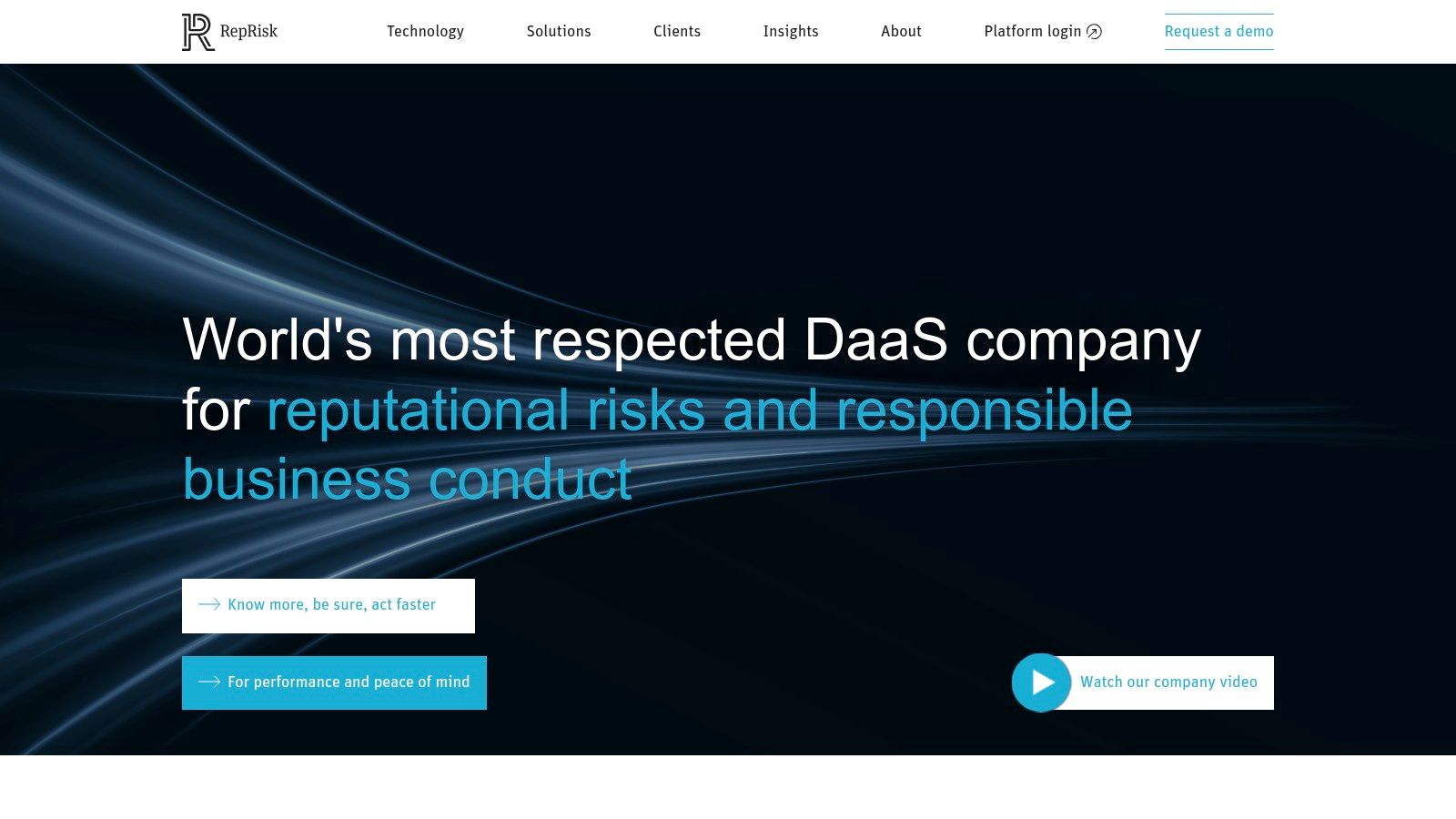
The platform distinguishes itself by leveraging a combination of artificial intelligence and human analysis to screen over 100,000 public and private sources in 23 languages daily. This approach allows it to capture risk-related information that is often missed by company self-disclosures, providing a more transparent, outside-in perspective on a supplier's or partner's real-world conduct.
Ideal Use Case and Key Features
RepRisk is indispensable for supply chain managers, compliance officers, and investment professionals who need to screen third parties for potential environmental or social controversies. It helps identify risks like pollution incidents, human rights violations, or greenwashing before they can impact a company’s operations or brand reputation.
- Feature Focus: Daily-updated risk metrics, a comprehensive database on over 240,000 companies, and mapping of risks to international standards like the UN Global Compact.
- Data Security: The platform operates as a secure, web-based portal, ensuring that sensitive risk data is accessible only to authorised users.
- Implementation: Access is provided through its ESG Risk Platform, data feeds for system integration, or custom-tailored reports. Onboarding involves defining the scope of monitoring (e.g., a portfolio of suppliers) and configuring alerts based on specific risk criteria.
Practical Assessment
While RepRisk offers unparalleled depth in risk identification, it is not a direct carbon accounting or life-cycle assessment tool. Its primary strength lies in qualitative and quantitative risk screening, not in calculating a company's Scope 1, 2, or 3 emissions. Access to its comprehensive database is subscription-based, with pricing tailored to organisational needs and requiring a direct inquiry.
Key Benefit: RepRisk excels at providing an early warning system for ESG and reputational risks within a supply chain, enabling proactive management of non-financial liabilities.
Website: https://www.reprisk.com/
11. CarbonBright
CarbonBright is a specialised, AI-powered platform focusing on real-time Life Cycle Analysis (LCA) for consumer goods. It distinguishes itself by leveraging artificial intelligence to deliver immediate, granular insights into the environmental impact of products throughout the supply chain. This makes it one of the most dynamic tools to track environmental impact, particularly for fast-moving consumer goods (FMCG) companies that need to make rapid, data-informed decisions on product design and sourcing.
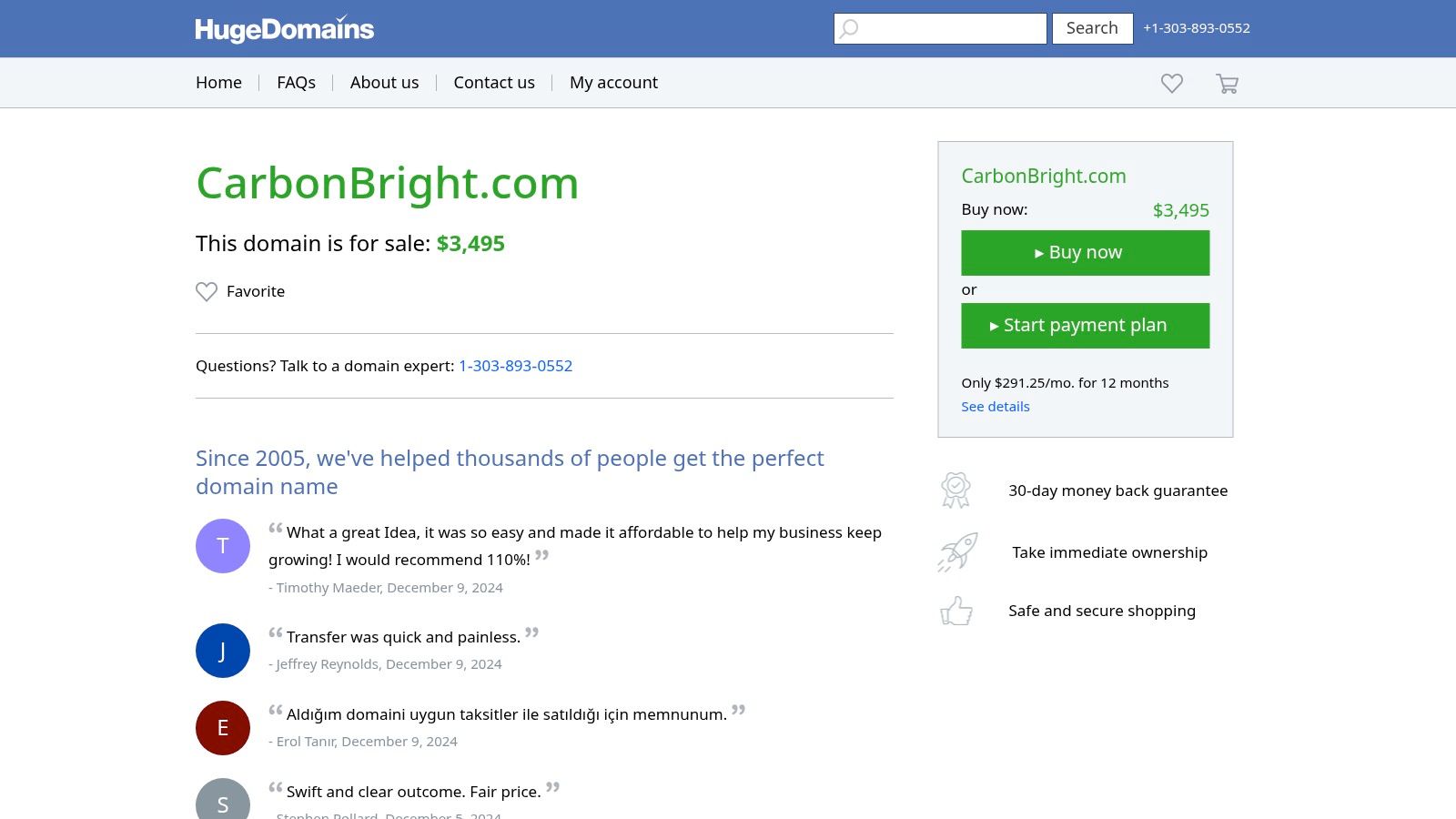
The platform is engineered for user-friendliness, translating complex LCA data into actionable insights without requiring deep technical expertise from the user. Its core strength lies in its ability to model the carbon footprint of products in real-time, allowing teams to simulate the impact of material or supplier changes almost instantaneously. This provides a significant advantage over traditional, more static LCA methods.
Ideal Use Case and Key Features
CarbonBright is ideal for product development, procurement, and sustainability teams within the consumer goods sector who need to embed environmental considerations directly into their daily workflows. The platform’s real-time feedback loop supports agile product design and responsible sourcing strategies.
- Feature Focus: Real-time product life cycle analysis, AI-driven supply chain insights, and scenario modelling for carbon reduction.
- Data Security: The platform operates with secure data handling protocols necessary for managing proprietary product formulation and supply chain information.
- Implementation: Effective use requires integration with existing product management and supply chain systems to feed the AI engine with accurate data. Businesses should plan for a data integration phase to map product bills of materials and supplier details into the platform.
Practical Assessment
The platform’s real-time, AI-driven assessments are its primary advantage, offering unparalleled speed. However, the accuracy of these insights is fundamentally dependent on the quality and completeness of the data provided. Companies with poor data maturity in their supply chain may face challenges during implementation. Pricing is customised based on the scope of use and requires a direct inquiry.
Key Benefit: CarbonBright excels at making sophisticated Life Cycle Analysis accessible and real-time, empowering brands to rapidly evaluate and reduce the carbon footprint of their products.
Website: https://carbonbright.com/
12. IBM Environmental Intelligence Suite
IBM's Environmental Intelligence Suite is a powerful, AI-driven platform that goes beyond standard emissions tracking to offer comprehensive environmental risk management. It integrates weather, climate, and operational data to help enterprises anticipate and respond to disruptive environmental conditions, making it one of the most robust tools to track environmental impact from both a compliance and an operational resilience perspective. The suite is designed for large-scale organisations managing complex physical assets and supply chains.
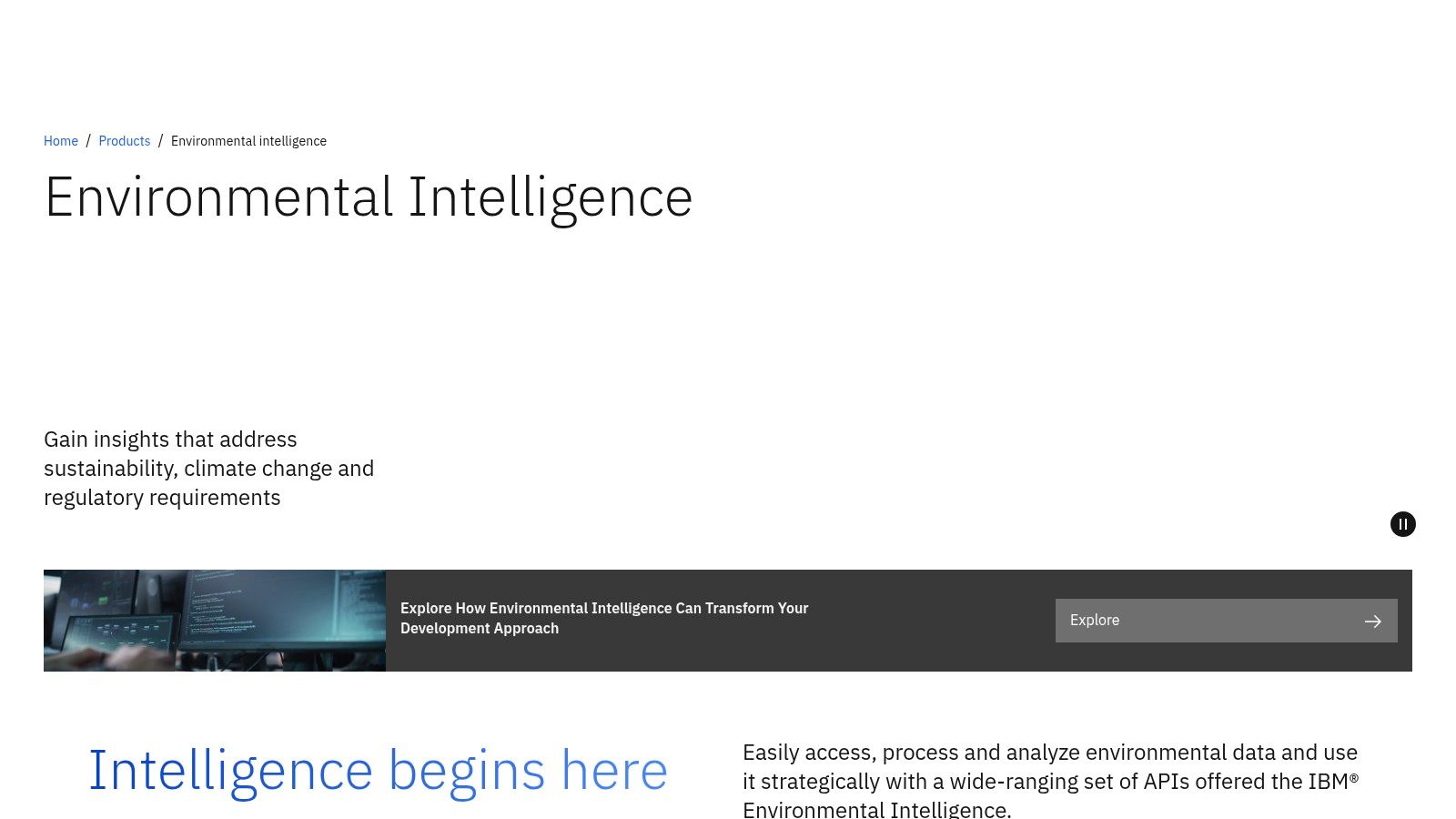
This platform excels by combining real-time monitoring and predictive analytics. It uses geospatial data and AI to forecast the impact of climate events like floods, wildfires, or extreme weather on business operations, allowing for proactive risk mitigation. This focus on future-proofing operations distinguishes it from tools solely centred on historical carbon accounting.
Ideal Use Case and Key Features
The suite is ideal for industries like energy, agriculture, transport, and retail, where operational continuity is directly threatened by climate and weather events. It helps organisations build resilience by turning environmental data into actionable insights for strategic planning and day-to-day management.
- Feature Focus: Geospatial analytics, AI-powered predictive models for climate risk, and integrated carbon accounting modules.
- Data Security: Leverages IBM's enterprise-grade security protocols, ensuring robust protection for sensitive operational and environmental data.
- Implementation: As an enterprise solution, implementation is a significant project involving integration with existing operational systems (e.g., ERP, supply chain management). A dedicated project team is typically required for a successful deployment.
Practical Assessment
The platform’s strength is its predictive capability and operational risk focus. However, its complexity and enterprise-level pricing structure make it less suitable for small or medium-sized businesses. It is best leveraged by large corporations with the resources to integrate and act on its sophisticated analytics. Pricing is available via a direct quote.
Key Benefit: The IBM Environmental Intelligence Suite provides unparalleled predictive insights, enabling large enterprises to manage climate-related risks proactively and integrate environmental intelligence directly into their core business operations.
Website: https://www.ibm.com/products/environmental-intelligence-suite
Environmental Impact Tracking Tools Comparison
| Platform | Core Features & Accuracy | User Experience & Quality ★★★★☆ | Value Proposition & Pricing 💰 | Target Audience 👥 | Unique Selling Points ✨ |
|---|---|---|---|---|---|
| 🏆 Carbonpunk | AI-driven real-time CO₂ tracking, 95%+ accuracy | Intuitive dashboards, predictive forecasting | Custom pricing, saves cost & time | Large enterprises, sustainability & logistics teams | AI analytics for 20–30% emission reduction, audit-ready ESG reports |
| Greenly | Carbon accounting suite, ISO 27001 security | User-friendly interface | Mid-range, broad service suite | SMEs & diverse industries | Strong data security, adaptable platform |
| SimaPro | Detailed LCA studies, multi-user support | Reliable data but steep learning curve | Premium pricing | LCA experts, product-focused businesses | Deep LCA capabilities, transparent data |
| Enablon Environmental Analysis Software | Compliance management (ISO 14001 focus) | Robust but complex to implement | Enterprise level, cost on request | Companies needing strong regulatory compliance | Extensive compliance tracking, air management tools |
| GaBi LCA Software | Detailed LCA, extensive database | Accurate but higher cost | Higher cost | Advanced environmental assessors | High-quality database, scenario analysis |
| OpenLCA | Free, open-source LCA | Cost-effective but needs technical expertise | Free | Academia, research, budget-conscious users | Open-source with extensive data support |
| OneClickLCA | Automated LCA & reporting, compliance support | Easy to use, automation focused | Moderate | Construction & manufacturing sectors | Efficient reporting, standard compliance |
| Ecologi | Carbon footprint calc, funds reforestation projects | Transparent operations | Subscription-based | Individuals, businesses focused on offsets | Emission offset focus, public transparency |
| Yayzy | Personal carbon estimation via financial data | Automated tracking via banking integration | Moderate | Consumers, fintech platforms | ML-driven personal CO₂ estimates |
| RepRisk | ESG risk monitoring, large database | Daily updates, risk-focused | Enterprise pricing | ESG analysts, risk management teams | ESG risk research, global coverage |
| CarbonBright | Real-time LCA, AI insights | User-friendly, supply chain focus | Custom pricing | Businesses tracking consumer goods footprint | AI-driven live LCA assessments |
| IBM Environmental Intelligence Suite | Real-time env. monitoring & risk analytics | Comprehensive but pricey | High-end enterprise | Large enterprises managing climate & environmental risks | Predictive environmental risk analytics |
Choosing Your Path to Net-Zero: From Data to Decisive Action
Navigating the landscape of environmental impact tracking tools can feel as complex as the supply chains they are designed to analyse. As we have explored, the market offers a diverse array of solutions, from specialised Life Cycle Assessment (LCA) powerhouses like SimaPro and GaBi to comprehensive, AI-driven platforms such as Carbonpunk and the IBM Environmental Intelligence Suite. The journey from recognising the need for sustainability reporting to implementing a robust system is no small feat, but the selection of the right tool is the critical first step towards transforming opaque environmental data into transparent, actionable insights.
The key takeaway from our deep dive is that there is no single "best" tool for every organisation. The ideal solution is deeply contextual, hinging on your specific industry, operational complexity, regulatory pressures, and long-term strategic goals. A logistics firm focused on optimising fleet emissions will have vastly different requirements than a manufacturing enterprise needing granular, product-level LCA data to satisfy customer demands or a financial institution screening its portfolio for ESG risks with a tool like RepRisk.
From Evaluation to Implementation: Your Next Steps
The decision-making process should be as structured and data-driven as the sustainability reporting you aim to achieve. Before committing to a platform, your team must move beyond feature lists and marketing promises to undertake a thorough internal evaluation.
Here is a practical framework to guide your selection:
- Define Your Core Objective: What is the primary problem you are trying to solve? Is it regulatory compliance (like CSRD), supply chain decarbonisation, product innovation, or investor relations? Your primary goal will immediately narrow the field. For instance, if compliance is paramount, a platform like Enablon with its strong regulatory modules might be a front-runner.
- Assess Your Data Maturity: Be honest about the state of your existing data. Do you have reliable, accessible data from your Scope 1, 2, and 3 sources? If your data is siloed and disorganised, you will need a tool with strong data integration capabilities and perhaps even consulting support to organise your initial data sets.
- Evaluate Scalability and Future Needs: Your sustainability journey will evolve. The tool you choose today must support your ambitions for tomorrow. Consider platforms that offer modular approaches, allowing you to start with foundational carbon accounting and later expand into water usage, waste management, or biodiversity impact analysis.
- Scrutinise the Methodology: Understand the calculation methodologies and data sources a platform uses. For credible, defensible reporting, look for tools that adhere to recognised standards like the GHG Protocol and use verified, region-specific emission factor databases. Open-source options like OpenLCA offer transparency here, while commercial tools should be able to provide clear documentation on their data provenance.
Beyond the Software: People and Processes
Remember, the most powerful software is ineffective without the right people and processes to support it. Implementation is not merely a technical task; it is a change management initiative. Successful adoption requires buy-in from across the organisation, from the C-suite to operational managers. It involves training teams, redesigning workflows to ensure continuous data capture, and fostering a culture where environmental performance is valued as a core business metric. The selection of tools to track environmental impact is therefore not just an IT decision, but a strategic business one that signals a genuine commitment to a more sustainable future. The journey to net-zero is a marathon, not a sprint, and choosing the right technological partner is essential for setting a sustainable pace.
Ready to move from complex data to clear, decisive climate action? Carbonpunk offers an AI-powered platform designed to automate carbon accounting and provide deep insights into your supply chain's environmental footprint. See how our advanced analytics can simplify your sustainability reporting by exploring Carbonpunk today.